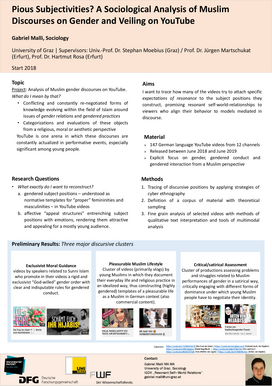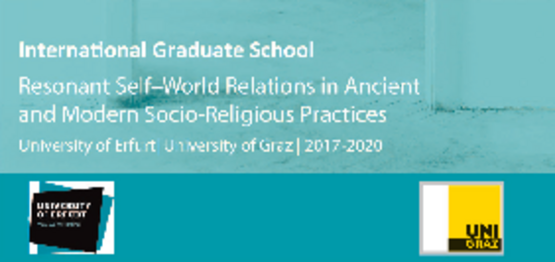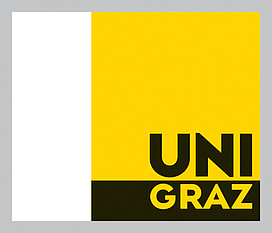Gabriel Malli (Kopie 1)
Pious subjectivities? A sociological analysis of Muslim discourses on gender and veiling
It is a well-researched phenomenon that new (mass) media formats are used to convey religious knowledge: Actors of the religious field try to pass on doctrines and recommendations about the "right" practice of faith, and constitute it as attractive. In the Internet Age, social online networks play a central role in such processes and have the potential to reach a predominantly young audience, whereby specific religiously coded forms of relationships, practices, events, spaces or objects are constituted as "ingredients" for a successful and resonant life.
In the course of my research project, I deal with formats on social media platforms (mainly YouTube) that negotiate questions of gender order or gendered dress codes mainly for a young target audience from an Islamic perspective, whereby the practice of veiling is often a central point of reference. Initial explorations have made clear that positions characterized by a subjective approach to Islam, gender and clothing based on practical everyday problems are contrasted with those that from a religious-authoritative perspective demand certain forms of practice as being willed by God and thus necessary. Such discourses often seem to operate negatively by accentuating differences to alienated and immoral "Western" everyday practice. In this context, the project will investigate which gendered subject models - understood as positively or negatively connoted templates of religiously legitimized masculinities or femininities - are constructed in discourse and which everyday practical instructions are linked to them.
Consequently, I would like to understand social media as an arena of discourse in which various actors attempt to constitute their views of religious practice as legitimate. In this context, I look for possible hegemonies in the discursive field as well as for conflictual constellations in which dominant positions are challenged. In addition to such a reconstruction of the structure of the field, I am also concerned with symbolic, aesthetic and narrative elements in the respective formats that are intended to make the performance of the contents plausible, aim at the affection of the (youth) audience or even attempt to make a kind of "resonance promise".
For the creation of a data corpus with relevant media, I use approaches of Grounded Theory methodology (especially theoretical sampling) to make visible the range of positions occurring in the discursive field. Subsequently, the selection of data will be guided by methodological concepts of the sociology of knowledge approach to discourse analysis (Keller) in order to examine interpretation frames, classification systems, subject positions and narrative structures. Hermeneutic approaches will be applied for the detailed analysis of media formats.
CV
10/2012-09/2015: Bachelor of Sociology, University of Graz (BA)
10/2012-02/2017: Bachelor's Degree in Economics, University of Graz (BA econ.)
10/2015-06/2018: Master studies in Sociology, University of Graz (MA)
10/2016-09/2019: International Joint Master Program in Cultural Sociology, University of Grat and University of Trento, Italy
since 10/2018: International Graduate School "Resonant Self-World Relations in Ancient and Modern Socio-Religious Practices", University of Graz and Max-Weber-Kolleg of the University of Erfurt





